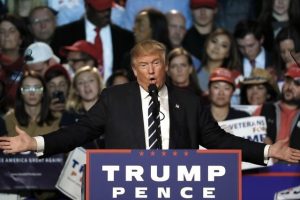Barack Obama’s last scheduled foreign tour as US president is under way and it is heavy with presentiments about his successor’s plans for when he gets to the White House.
While in Greece, Mr Obama may have been conscious that his praise for the European Union was as haunting as a dirge. When Donald Trump takes office on January 20, he will be the first American president since the start of formal European integration to seemingly regard the project with disfavour. Seemingly, because Mr Trump supports Brexit.
For now, it is Mr Trump’s unconventional remarks during the election campaign that are being used to build a picture of the president-elect’s view of the world beyond America’s borders.
And yet, a great deal more material exists, going back 30 years. It tells us that America’s 45th president has firm, long-held ideas, which if translated into policy, could mean the end of the liberal international order that the US helped design after the Second World War.
Thomas Wright, US foreign policy expert at the Brookings Institution, has been looking through Mr Trump’s public statements about international affairs since the 1980s.
He has established that contrary to general opinion, Mr Trump’s view of the world is not flighty at all.
In fact, says Mr Wright, it has been consistent and has three main components: opposition to US alliances, opposition to free trade and support for authoritarianism.
Back in 1987, Mr Trump wrote an open letter to the American people, which he placed as a full-page ad in The New York Times, The Boston Globe and the Washington Post.
In it Mr Trump said the same things we heard on the campaign trail, and which 60 million American voters appear to have found palatable.
He said that the US should not be taking care of Saudi Arabia, Japan and other countries’ security. The US has no strategic interest in being in Asia militarily, he argued.
Then there is Mr Trump’s 1988 chat about that open letter with television talk show host Oprah Winfrey.
Even as relations between Iraq and Kuwait grew increasingly tense over crude production quotas, an oil glut and falling prices, Mr Trump expressed complete unconcern over the looming threat to Kuwait posed by Saddam Hussein. “We make it possible for them to sell their oil,” he says. “Why aren’t they paying us 25 per cent of what they’re making? It’s a joke.”
Finally, there is Mr Trump’s 1990 Playboy magazine interview on the subject of strong leadership for countries in turmoil.
Mr Trump was speaking after the Soviet Union’s last leader Mikhail Gorbachev’s introduction of two reformist policies — glasnost and perestroika.
The new freedoms were being used by the discontented and various nationalist movements to whip up dissent.
Mr Trump had just visited the Soviet Union and come away “very unimpressed. Their system is a disaster…That’s my problem with Gorbachev. Not a firm enough hand.”
He went on to praise the Chinese government’s response to the Tiananmen Square protests.
“They were vicious, they were horrible, but they put it down with strength. That shows you the power of strength. Our country is right now perceived as weak,” he said.
Now that Mr Trump will be president, the open letter and Oprah and Playboy interviews can justifiably be regarded as historical record.
They are an archive of how this American president’s foreign policy decisions were shaped and articulated over time. Each of those pieces of historical material throw up probabilities about Mr Trump’s America.
It may be less inclined to making and keeping international alliances. It may seek a mercantilist international economic system rather than playing by agreed upon free trade rules. And it may be tough — “vicious…horrible” in Mr Trump’s praise for Beijing — on critics both at home and abroad.
Taken together, these would mean a massive change for the world order. American leadership, particularly the rule-bound system of liberal values it has represented, will be greatly eroded, far more than by any of its lapses, hypocrisy and partisan meddling.
There is no sign Mr Trump is particularly interested in Pax Americana.
And he hasn’t ever really talked about the importance of democracy and human rights anywhere, let alone overseas.
A one-term Trump presidency would begin a process that can only accelerate if he were reelected and in office till 2024.
Trumpian America’s disinterest in alliances without a hefty payback would mean the rolling back of US deterrence and a refusal to check aggressive countries, not least Russia.
After his examination of decades of Mr Trump’s statements, Mr Wright of Brookings is pessimistic.
There would be a lot of revisionism, he says, countries testing borders and trying to protect their own interests unilaterally. Conflict would flare. There might be wars between unlikely rivals.
Perhaps these seem like overly gloomy prophecies nine weeks before Mr Trump takes his oath of office.
But it is true that from Harry Truman, who was president during the closing months of the Second World War, every US president has believed in America’s indispensable role as a global force for good.
Mr Trump seems to think self-centred America First policies are enough to make it great again.


